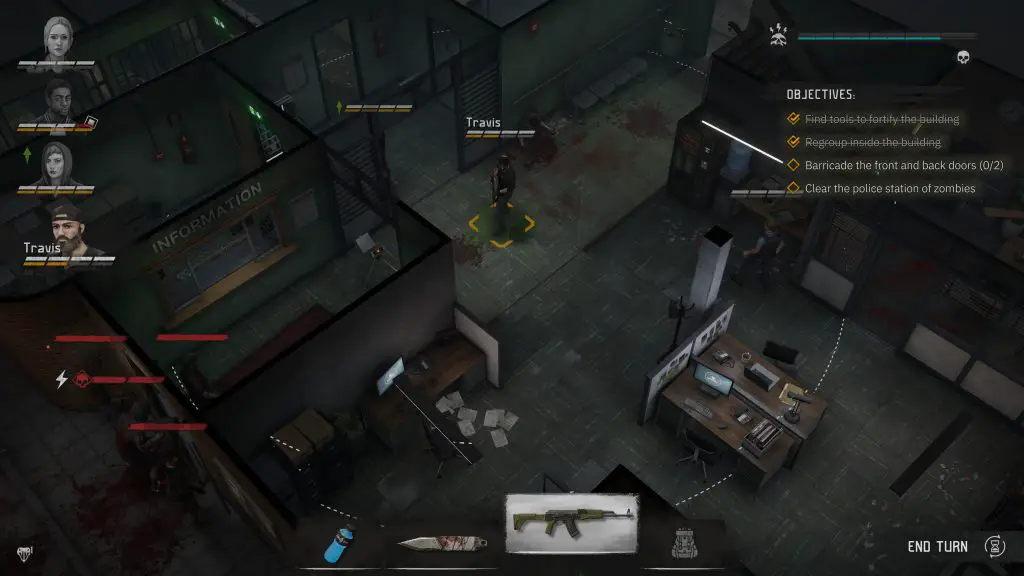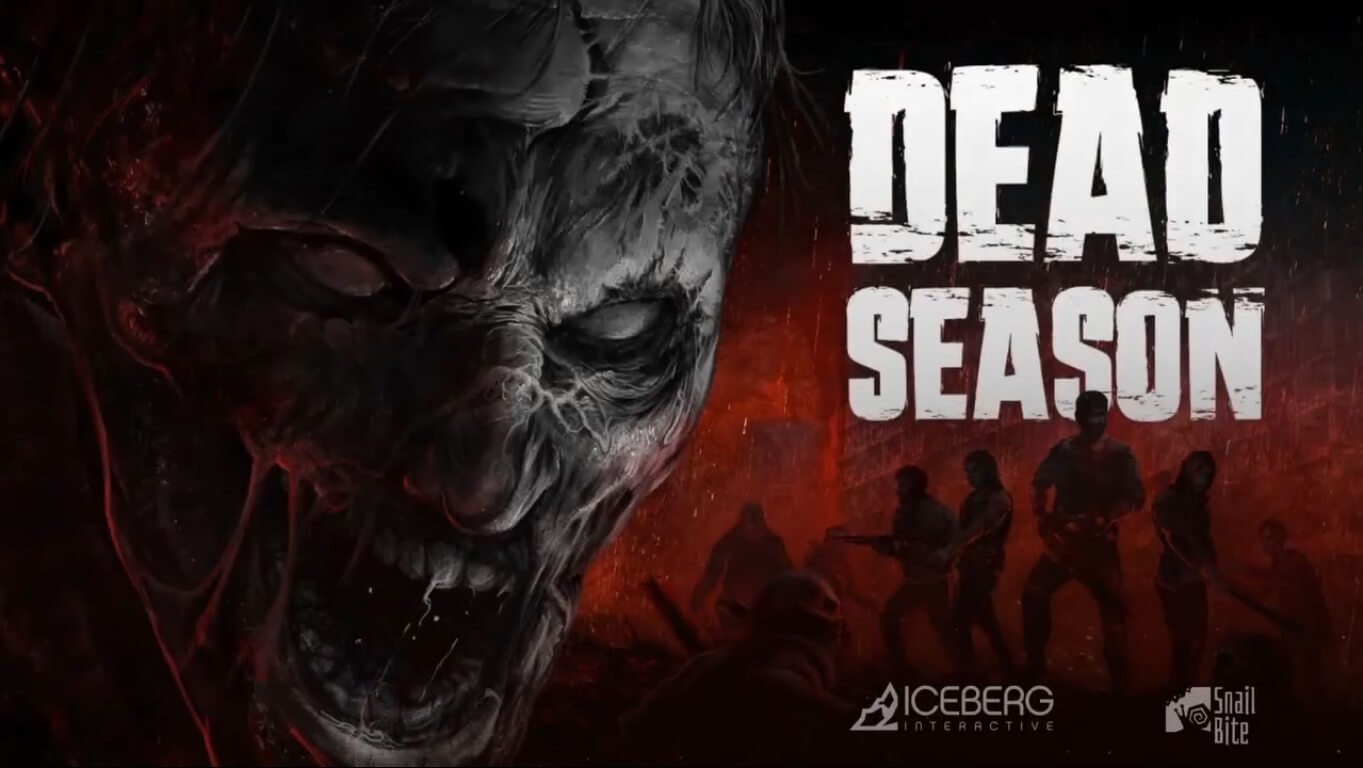It always seems like to me that there is a certain convention when it comes to zombie games. If in doubt, turn to a random page in the dictionary and name your game “Dead <Word>”. We’ve seen Dead Island, Dead Rising, Dead Space and even Dead Cells. That’s before we even try and work out how Valve’s new game Deadlock fits in.
Today, though, we’re going to be taking a look at the new turn-based tactical RPG Dead Season, the debut game from solo developer studio Snail Bite. Published by Iceberg Interactive, it will be available on Steam on October 8th.
Table of contents:
The Beginning
Stop me if you have heard this one before. Four characters from a variety of backgrounds meet in a zombie apocalypse and have to hastily build trust and cooperate in order to try and make it out alive. At this point it’s very much a cliché of the genre and is going to throw most players back to fond memories of Left 4 Dead, one of the clear inspirations for this title.
Upon starting the game I was immediately introduced to Francis Travis, the biker of the group. On that note, if I ever hear of a zombie outbreak on the news I am heading right to the local bike gang as they seem to have an especially high survival rate in post apocalyptic scenarios.
A quick tutorial then introduces us to some key mechanics of the game. You are going to be controlling your group of 4 survivors in XCOM style tactical engagements, making your way across the city in search of help. In a slight departure from many recent zombie games, Dead Season makes an effort to streamline the mechanics that have become so prevalent in the genre to focus on trying to deliver meaningful missions.

Throughout your journey, you will not need to worry about crafting (there are a couple of attachments for weapons, but it’s minor), food, or ammunition. You still do have to scavenge, as your gear can break between missions and you will constantly be on the lookout for new weapons to keep the group armed. Just be aware this is more of an RPG-lite experience than a survival one and is certainly not trying to be a turn-based competitor of Project Zomboid or Terminus: Zombie Survivors.
As for any sort of goal, it’s mostly to survive and seek safety. Between missions the narrative will play out through black and white motion comics which are a nice stylistic touch. I would have loved to see these get the full voice acting treatment as I never really felt truly connected to my little group. The game’s requirement that every mission must be finished with all characters alive would certainly be much easier to get on board with if I had a genuine investment in the survivors.
The Combat
The story is the standard zombie apocalypse affair and mainly serves to shepherd us from one map to another where we will be cracking some skulls, so let’s dive into the combat. The game works on a simple 4AP system. Each character has four action points a turn that can be spent on either moving, shooting or melee.
There are some traits or items that can temporarily increase this number, and some special actions like barricading will take up the majority of your turn, but it’s an easy-to-understand system that generally works well, although some players are certainly going to feel it’s rather sluggish.
While looking into this game, I did note that one of the complaints many people had prior were relating to low hit chances, and I am pleased to say these have been raised for the full release. It’s good to see the feedback taken on board because I certainly would have struggled more with this title if I was missing more often than not. The sound design also deserves a nod as every weapon swing that connects will be greeted with a satisfying meaty thud, usually alongside an exploded head.

To truly add on to that feeling of guiding your ragtag band through a zombie infested environment, the vast majority of missions feature infinite spawns. I personally quite like this as a mechanic with the tone the game is going for. Many zombie games (especially board games) play with the idea of managing your time between handling objectives and keeping the horde at bay. It forces the player into tight decision making rather than clearing maps room to room like a squad of marines. Not exactly how I imagine a group of civilians acting.
The advertised noise system also plays a part here. Making gradual noise over different turns will bring additional zombies to the field and making too much noise in one turn will spur all enemies into an agitated rage giving them additional movement.
While I commend Dead Season for thinking about more novel ways to encourage strategic weapon use, I did find the secondary noise bar that builds up over time to be completely ignorable. Getting to use firearms more freely is easily worth an extra zed or two… until the gun jams anyway.

There are some features that are going to be a little more divisive. While you can, of course, see your own movement ranges, you are not given any indication of how enemies will act or how far they can move. This problem is especially noticeable when zombie variants show up or any zombies are enraged.
You can quickly learn that a regular zombie will move two tiles and plan your distance accordingly, but what about this slightly gassy-looking undead in a hazmat suit? Will he move differently? Attack differently? Have special effects on death? The only way to find out is by trial and error, which is something you really don’t want to be doing when one team member’s death is going to cause an immediate reload.
Finally I did feel there was a slight lack of variety here as far as tactical options go. Weapons have different ranges and hit chances but all feel rather samey (melee weapons are particularly guilty of this). There is only a limited selection of melee and ranged options across the game and almost all only deal one damage at best. There are some attempts to mix this up with the assault rifle firing three shots or the ability to dual wield pistols but your equipment choices will be generally lacking.
The Journey
Dead Season will take you across sixteen linear missions as you traverse the city, totalling around 10 hours of gameplay. At four different points, you will be presented with a crossroad and an option of two missions. Each mission will see you doing more or less the same thing. Get to point X, or hold point Y, often a combination of the two.

The missions were fun enough, but I never felt there were enough different ways to approach a mission to justify playing this game back through a second time to view the four missions I missed. A couple of stealth missions are also thrown in for a bit of variation; however, these take place in a very limited environment where you are mostly forced down one route. I do appreciate the attempt to add some variety and break up the more combat-heavy sections, but I felt the stealth sections were more of a weak point that really needed a little more fleshing out.
After each mission, you will be awarded with a set amount of experience and the ability to upgrade your squad. There doesn’t seem to be any way to influence the amount of XP you are given for a completed mission. I understand in earlier versions of the game you were penalised if you didn’t get the whole squad out rather than outright failing but with the current iteration it feels rather unnecessary. You can then spend that XP to unlock perks for your characters and work your way through a skill tree.

In what feels like another missed opportunity, the skill tree is almost identical for every character, with only 2 of the 15 total perks being unique to each survivor. I constantly got the feeling Dead Season was trying to be 2 conflicting genres at once, on one hand it leans towards a more hardcore tactical experience with the unrelenting tone of the game and numerous “gotcha” moments. On the other hand, it’s a relatively accessible strategy-lite RPG with simplified character/combat mechanics and linear progression. Personally, I would have preferred to see it lean further in one direction.
Final Thoughts
For all my gripes, I would struggle to describe Dead Season as a bad game. It looks good, it runs well and there is a decent tactical slant to the combat but, much like the last can of food in a postapocalyptic supermarket, this experience is only going to be treasured by those truly hungry. If you really crave some turn-based zombie action or want a more linear light strategy experience, there is some fun to have here. For those on the fence, it’s a far harder sell.
I hope the developer continues to add to this game from a gameplay perspective because what it does effectively is give me the same feeling I would get from a game of Zombicide: always teetering on the brink of being overwhelmed. It just feels like it’s missing a real hook to make players love it.
The review code for this game was kindly provided by Iceberg Interactive.







